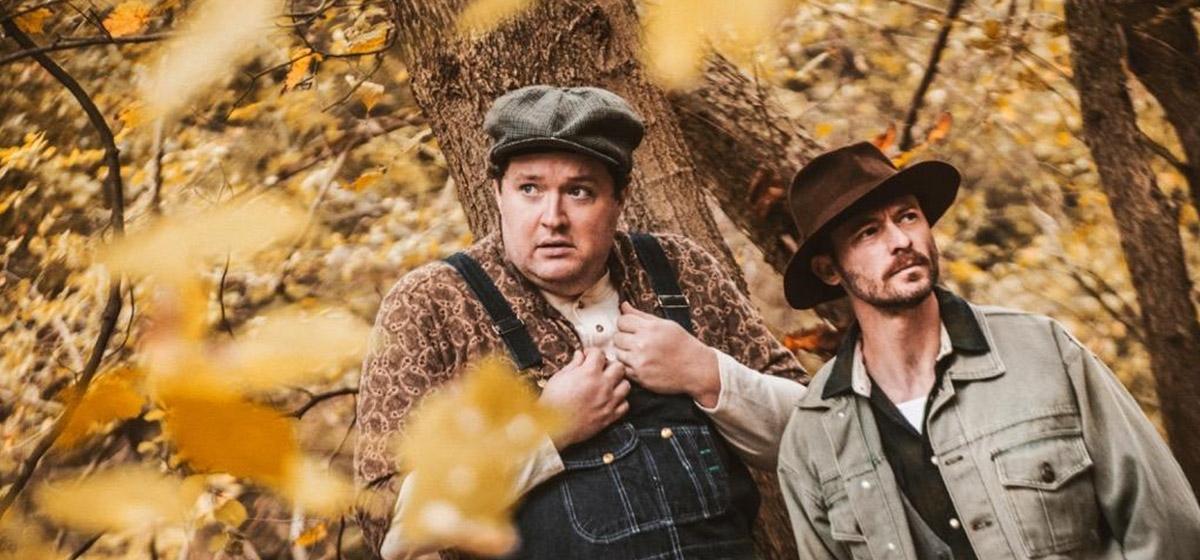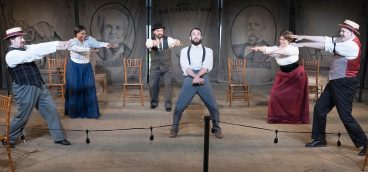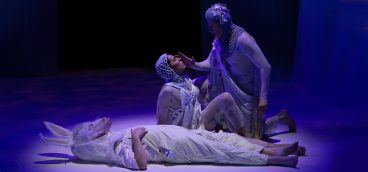
Perhaps all drama should be analyzed as the Kabbalists interpret Torah—on many levels simultaneously, comprising the literal, the symbolic, the metaphoric, and the mystical. This might allow us to understand and enjoy what others may miss or dislike, without resulting in one conclusion that necessitates a myopic choice of perspective.
I felt this way watching Prime Stage Theatre’s production of “Of Mice and Men” which is a work that can be enjoyed on many levels and by many audiences. There is a literal story here that will appeal to children, as well as a symbolic tale about humanity for adults, a metaphoric one that may affect us per our unique life experience, and ultimately, there is the deepest form of drama, in this case, tragedy, when something happens that we cannot find words for.
It is this last point that makes this play so relevant today, when tragedy has become so quotidian—in the nation, as well as in the neighborhood—that we have become numb to words. I have never appreciated Nietzsche’s observation that, “What we have words for must already be dead in our hearts” more so than I have in the past year, in the past month, and even in the past week.
These are raw days in Pittsburgh. And this 1937 play by John Steinbeck, based on his novella of the same year, is a raw view into human nature. On the simplest level, Steinbeck has produced a kind of template for what would evolve into the “buddy” or “road” film genre, a story about two very different men wandering together in search of a better life. However, unlike today, which might be characterized as a time of tragic violence, these men are struggling in a time of tragic poverty.
George (Corey Rieger) has taken the intellectually disabled Lennie (Liam Macik) as a traveling companion to roam the farmlands of California in search of menial work.
Director Scott P. Calhoon keeps the pacing slow, which allows the actors to reveal the depth of their character’s relationship in small, convincing ways—chattering and bickering while they build a fire, for example. In fact, so little happens during the first quarter of the show that we might be watching “Waiting for Godot;” but in these 30 minutes the force and power of the climax is laid like a silent foundation.
Lennie is one of the archetypal characters of the American stage (a “gentle giant” so big he doesn’t know his real strength) and, from the first moment, an actor has to decide whether to under- or overplay him. The latter is more tempting and common, but to his credit, Macik (who researched the role with experts from Western Psychiatric Institute) opts for the former, and his Lennie is a subtle creature who seems to exude a self-awareness of his own lack of awareness. Ironically, Macik’s largest obstacle is his voice, which is so theatrically resonant, it seeps through no matter how hard he tries to dumb his locution down. It’s like watching a man trying to cover his tuxedo with overalls.
Rieger also underplays George, and produces an accent that is as unobtrusive as it is believable. George is a master of passive-aggressive behavior, berating poor Lennie then building him up, again and again, until the two aren’t really talking, they’re riding a verbal see-saw that must go up and down like some sort of piston that keeps their lives beating.
George, being the smart one of the pair, feels that he has to be the responsible one, and Rieger lets us see his character’s exhausting process of joining Lennie’s imbecilic fantasies of tending rabbits and starting a little farm together, then drawing back into the dark reality of the world, where Lennie’s proclivities can cause serious trouble. As he observes, prophetically, “It ain’t bad people that raises hell, it’s dumb ones.”
Here Steinbeck lays on the metaphors—animals are killed by accident or put down on purpose—adumbrating the story’s human events—to the point that we almost want to yell out, yes, yes, we get it. Even Lennie’s last name, “Small” is a tautological pun. He is so big that he accidentally crushes everything he touches—mice, puppies and worse are destroyed by his blundering hands—yet he has not a mote of intent in him. He is an exterminating angel, what could be seen as a symbol of depression-era America, when large, mindless institutions crushed small, innocent lives routinely in the course of day-to-day business.
The pair’s happy existence starts to disintegrate as soon as they stop wandering and join the company of others on a farm where they are hired. They’re in such a delicate state of symbiosis that any outside intervention destroys their equilibrium.
Here they meet the belligerent Curley (Ryan Bergman), his flirty Wife (Vanessa St. Clair), the fair-minded Slim (Chris Cattell), and the pitiful Candy (Ken Lutz). These are Dickensonian characters, sketched out just enough on Steinbeck’s novella-sized canvas to stand for opposing forces that must attract, collide, and shatter. Unlike the two main characters, these roles (with the exception of Slim) are generally overplayed—perhaps to overcompensate for their limited stage time—and some of their scenes feel rushed.
Especially strong, however, is the encounter between Lennie and Crooks (Sam Lothard), the black stable hand, who comes to see Lennie as an outsider like himself, and buys into his fantasy of starting a farm where they, along with George and Candy, can all live in harmony. It is such a delicious American dream, juxtaposed to their execrable lives, that they all buy into it, even if they don’t really believe it. Just talking about it makes them high.
Suffusing and sustaining this ether of reverie are the technical components of the production, led by Johnmichael Bohach’s scenic design. He has somehow managed to turn the warehouse-like New Hazlett Theater into an intimate chamber—with a starkly minimalist set—as if he brought in a bunch of string-theory physicists to literally crush the space.
Angela Baughman’s sound design and J.R. Shaw’s lighting coalesce in the way your senses do if you’ve every stood in a country field at dusk and noticed how the sounds are colored by the light. We hear birdsong, barking dogs, and a game of horseshoes in the distance, not as recordings, but as vibrations being carried over vast distances. And the lighting seems to be reflected off the earth as it really is, not projected from klieg lamps.
This all builds into the mesmerizing conclusion, which plays out like an Old Testament (or equally atavistic) Old West drama. Certain laws of nature have been transgressed, and balance must be restored. An eye for an eye and bang, the play is literally over. There are no words of denouement because, as Steinbeck—a master tragedian—knew, they wouldn’t work.
Director Calhoon has eliminated the superfluous and eschewed the sentimental to leave us with a searing experience that starts like a buddy flick and ends like a Greek tragedy. This is a remarkable achievement and makes for compelling theatre on so many levels.
Note: Much to their credit, Prime Stage always offers programs and performances for special audiences, and these will include an Audio Description Performance on November 9th (for the blind and visually impaired); an Interpreted Performance on November 10th (for the deaf and hard of hearing); and a Post-Show Discussion on November 10th (with the psychiatric experts who consulted on the depiction of Lennie’s intellectual and developmental disabilities). There are also dedicated student matinees.
“Of Mice and Men” runs through November 11th. New Hazlett Theater, 6 Allegheny Square East, Northside. 412-608-2262 or www.primestage.com





